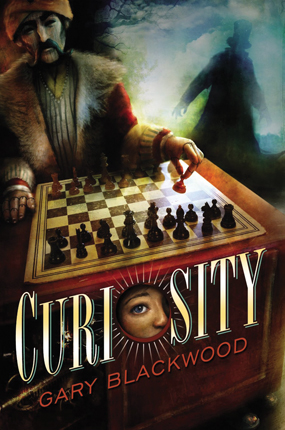Full Text Reviews: School Library Journal - 03/01/2014 Gr 5–8—Following his beloved father's incarceration in debtor's prison, 12-year-old Rufus finds himself penniless on the streets of Philadelphia in 1835, with not much more than a preternatural command of chess. Rescued from a refuge house by a mysterious Frenchman, he is thrust into service as the operator of The Turk, an automaton chess player that has dazzled audiences and mystified skeptics for decades. Rufus feels useful for the first time in his life, but it's not long before he worries that he has become a mere pawn in the hand of the Turk's creator, and maybe even the machine itself. Blackwood has succeeded at infusing Curiosity with a truly gothic mood—every scene and page seems a little sooty and overwhelmingly foreboding. While Rufus's narration occasionally turns slightly mawkish, readers will no doubt find him a compelling protagonist and likable hero. Mentions of new technology and cameos from P. T. Barnum and Edgar Allan Poe ground the story in its time period. The Dickensian cast of characters and tightly constructed plot will resonate with fans of Laura Amy Schlitz's Splendors and Glooms (Candlewick, 2012).—Erinn Black Salge, Saint Peter's Prep, Jersey City, NJ - Copyright 2014 Publishers Weekly, Library Journal and/or School Library Journal used with permission. Bulletin for the Center... - 05/01/2014 Twelve-year-old Rufus Goodspeed has one chance to spring his father from debtors’ prison—to parlay his local reputation as a chess prodigy in 1835 Philadelphia into a job with Johann Maelzel, owner of the Turk, a chess-playing automaton that is the crown jewel in his exhibition. In doing so, Rufus becomes privy to the machine’s operation and Maelzel’s secret: Rufus is simply the latest in a line of the Turk’s operators, who sit inside and play endgames and full matches, and whose lives are threatened if they ever reveal the truth behind the machine’s success. Blackwood constructs a plot with appeal to several readerships: the gearheads who enjoy the mechanical workings of these robotic oddities, à la Selznick’s The Invention of Hugo Cabret (BCCB 4/07); those who shiver at the possibility of life force within the machine, à la Schlitz’s Splendors and Glooms (BCCB 10/12); those who gravitate toward plucky orphan stories; and of course, those who appreciate a solid historical fiction riff on a real-life invention, the Turk itself. Rufus’ self-effacing narration is thoroughly engaging; acknowledging that not all of his listeners will be equally intrigued with the game of chess, he handily brings the ignorant up to speed and then moves briskly along with the details of his precarious employment, and the bittersweet climax to his family drama. An afterword remarks on Maelzel and other featured historical characters. EB - Copyright 2014 The Board of Trustees of the University of Illinois. Booklist - 04/15/2014 Inquisitive, motherless Rufus, a frail and hunchbacked boy in nineteenth-century Philadelphia, has shown a preternatural ability to play chess from a remarkably early age. And when his parson father is sent to debtor’s prison, Rufus’ chess skills are all he can rely on. In a stroke of luck, he meets the volatile man who owns the Turk, a real-life chess-playing automaton that gained world renown in nineteenth-century Europe and North America. Rufus is hired to operate the machine while crouched inside and keep the Turk’s secret under tight lock and key, though soon he is unwittingly caught up in a plot to debunk the clockwork chess master. While the first-person narrative, which is chock-a-block with chess terminology, occasionally becomes annoyingly self-referential—a cast of fictional and historical figures includes grand showman P. T. Barnum; Edgar Allan Poe and his teenage wife, Virginia; and the real-life owner of the Turk, Maelzel—this Dickensian coming-of-age story from the author of Around the World in 100 Days (2010) offers a glimpse into a quaint corner of American history. - Copyright 2014 Booklist. Loading...
|



